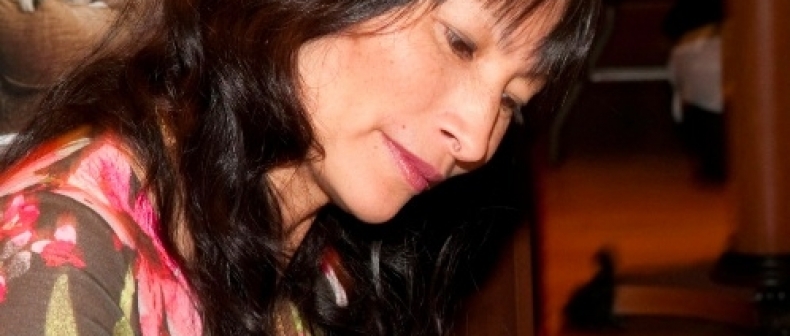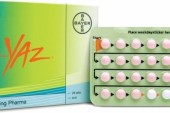
Tiffany Chow signs copies of her new book: The Memory Clinic: Stories of Hope and Healing for Alzheimer’s Patients and Their Families.
“Genes are not everything. What really counts is what you’re doing with those genes,” said Tiffany Chow, to a packed house at the Toronto Reference Library last week.
Chow is a Senior Scientist at the Rotman Research Institute in Behavioural Neurology. She recently released a book called The Memory Clinic: Stories of Hope and Healing for Alzheimer’s Patients and Their Families.
At 86, Chow’s mother, Ah Quan Ching, had a sizeable brain hemorrhage, lost consciousness and died. That type of bleeding, said Chow, is primarily due to “beta-amyloid lodging in the small arteries of the brain, taking away from the flexibility of these arteries until one day the plumbing breaks.” Beta-amyloids are found, to some degree, in most brains with advanced age, but are consistently found in the brains of Alzheimer’s sufferers.
Despite this beta-amyloid concentration, Ching lived a rich, full life right up until her death, free from the negative effects of advanced Alzheimer’s. Chow set out to answer the question: “What did she do that the rest of us should be doing?”
1 in 11 Canadians over age 65 have Alzheimer’s Disease or a related Dementia. One million Canadians will have it 25 years from now. It causes intense memory loss, personality changes, and skewed decision-making.
Toronto Standard spoke with Chow to find out what you can do to prevent damage despite a genetic pre-disposition to Alzheimer’s or dementia.
Read: This is imperative. “It can expand how you are encoding new information.” That means you can develop your capacity to do tasks in several ways, so that if you forget one of them, you have a back up. “The important thing,” says Chow, “is to build up that repertoire so you can compensate when amyloids build up in your brain.” It doesn’t matter if you read fiction or non-fiction, just as long as it’s something you enjoy so that you keep at it. For those who may not have had access to advanced education, reading is the simplest and most cost-effective way of gaining those positive effects.
Develop Social Networks: Not Facebook or Twitter, but through developing face-to-face social skills. Interacting with people in real life social situations develops your ability to adjust your demeanor “to be appropriate to people around you.” It allows you to develop narratives in your interactions, so that when you tell stories, you have an introduction, conflict, resolution and an end. It helps you to read how people react to you.
Get Smart: This does not necessarily have to be IQ, in fact, individuals with high IQ’s can have a greater chance of isolation. There are different types of intelligence, so aim to develop a more well-rounded intellect.
Get Happy: Those who suffer from recurring episodes of depression are at higher risk of developing Alzheimer’s. Seek professional treatment as soon as you feel a depressive episode coming on. Other mood disorders (like anxiety & PTSD) can activate cortisol release. Being subject too long to too much cortisol can shrink the hippocampus, which is “the first weigh station for new information”.
Protect Your Head: “There’s something about the smacks that make you vulnerable,” said Chow. Wear a helmet. Professional athletes who take a lot of hits to the skull have notably higher levels of ALS, Parkinson’s and other neurological diseases. But if you have had a few concussions, it doesn’t make Alzheimer’s inevitable. “Head trauma and PTSD can make the brain more vulnerable, but they are not equivalent to getting dementia, whether Alzheimer’s disease or another type of dementia. The genetics of dementia show their complexity in these cases, since some genetic traits might protect you from the increased risk brought on by head trauma, whereas others could amp up the risk.”
Eat Well: A diet low in fat with lots of leafy greens is recommended. Also, not consuming more protein than about the size of your palm on a daily basis. Chow recommends Michael Pollan’s “Food Rules: An Eater’s Manual,” an excellent resource on proper eating.
Get Fit: She recommends trying new exercise classes (which also addresses the social component and the neuroplasticity element of trying something new). You should exercise at least 20 minutes, three times per week.
Manage Stress: Stress is unavoidable. But you have to be able to manage it. “Are you feeling safe, healthy, happy, and loved at the end of each day? If not, contemplate on why not and how you can make changes. Sometimes it’s a matter of recognizing the stress as something you’ve chosen to do, but could do differently. Sometimes it’s a matter of letting go of something or someone that isn’t good for you. But our hearts and minds and brains don’t do well with chronic stress.”
Give yourself a break: If you’re a caregiver of someone with dementia, that means not taking on undue responsibility for curing them. “Unless you’re a venture capitalist, it’s not your job to scan the Internet everyday looking for a breakthrough in Alzheimer’s treatment. Keep them safe, free of pain, and see that they have some small measure of autonomy and at least one pleasurable moment a day” says Chow. “They just want to feel comfortable and accepted the way they are.”
Chow feels that the biggest misconception people have about Alzheimer’s is that you can’t diagnose the disease unless the patient’s brain has gone to autopsy. “While there are many different ways that people come to Alzheimer’s disease (e.g., diabetes, recurrent depression, or genetics), physicians have gotten pretty good at recognizing features of Alzheimer’s developing in an elderly person and then being able to help families anticipate changes and plan for them. I specifically don’t like this misconception because of the hopelessness of it. Families can get information that is helpful for compensating for symptoms, directing medical care, and, possibly more importantly, helping to set their loved ones up for success in living safely, happily, with love and other kinds of good health.”
Tiffany Chow’s book is available for purchase here. Visit PubMed for up to date medical research pertaining to advances in Alzheimer’s and Dementia research. Visit here to participate in clinical trials related to ongoing research.
____
Tiffy Thompson is a writer and illustrator for the Toronto Standard. Follow her on Twitter at @tiffyjthompson.
For more, follow us on Twitter at @TorontoStandard and subscribe to our newsletter.














